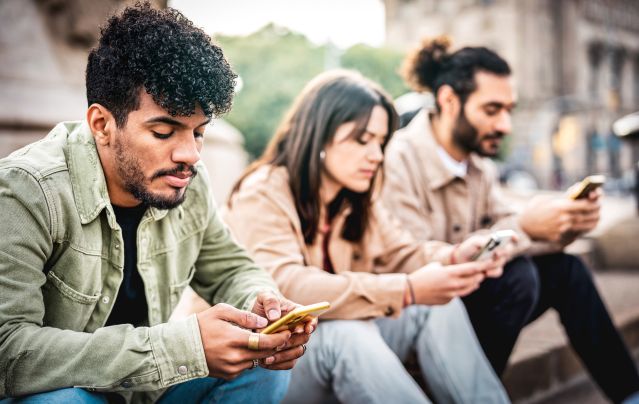Loneliness
Social Media's Sneaky Role in the Loneliness Epidemic
How "social snacking" corrodes social connection and how to overcome it.
Posted April 9, 2024 Reviewed by Michelle Quirk
Key points
- It’s amazing what tech can do, but alarming how dependent (and consumed) we’ve become with it.
- Very heavy social media users are more likely to feel alone, isolated, left out, and without companionship.
- High-quality connections online are rare because of how status-driven and polished the environments can be.

“Maybe I should go to the store like a ‘normal person’ but I choose delivery for my kumquats. And I choose to have a robot vacuum my floor. I choose to ride the escalator going down. And stream movies I own on DVD. And to let social media remember birthdays for me. I choose to unlock my front door via my smartwatch. I choose to date people by computational algorithms and will never ask for a date in-person like some sort of animal. I choose to buy a car from my couch and have it delivered to my front door because what you call lazy, I call brilliant.”
This was the script of a popular U.S. commercial by Carvana, an online car retailer, that aired during Super Bowl XLIX in 2014. It hilariously exemplified how technology has impacted every aspect of our lives, from meal delivery, to dating, to house security, to car buying. It’s hard to imagine settings that don’t include technology. Even when hiking in the middle of California's Yosemite National Park, far removed from the technological pulse of our day to day, streaming Spotify through a Bluetooth speaker is commonplace. And that’s both wonderful and worrisome. It’s amazing what tech can do, but alarming how dependent (and consumed) we’ve become with it.
Technology and Social Media Use
Of course, inherently, technology and social media aren’t bad. It’s a tool. But just like any tool, such as a hammer, it can be helpful or harmful, depending on how you use it. And, unfortunately, for most humans, we aren’t utilizing technology well. Instead of managing technology, the technology is often managing us. The ping, ding, and ring of our devices cause us to act, versus the other way around.
But, to our defense, technology and social media are really new to humanity. In the scheme of humankind, technology and social media is still a blastocyst (a very early stage of a growing embryo). Many of the technological advancements are so new, and we’re still learning how they're impacting (positively and negatively) our behaviors.
While technology and social media can be instrumental in sparking new connections and helping people find communities of like-minded people, they aren’t very useful for deepening those connections. It’s the old-fashioned, time-tested “oldie but goodie” actions like eye contact, empathy, smiling, physical touch, and other emotionally intelligent behaviors that move relationships in the direction we all ultimately crave and need.
Think of it this way: What happens when we don’t have a healthy and filling meal? We snack. Less nourishment, but it satisfies enough. If we snacked all the time, our body would lack the nutrition to stay strong and healthy. The same is true socially. If we don’t have healthy and filling conversations, we snack.
Social media has forced many of us to... "socially snack."
Social Snacking
“Social snacking” activities are described by psychologists as browsing through other people’s social media profiles or reading comments without contributing anything to the digital dialogue or connecting only over email, text, or chat.
Social snacking only provides the illusion of social sustenance. It temporarily masks loneliness. What people need are real, nourishing conversations.
When it comes to social media, studies show that very heavy social media users are significantly more likely to feel alone, isolated, left out, and without companionship. Social media has caused a comparison trap. Comparing our life to someone else’s highlight reel leads to questions of "Am I enough?" "What am I doing?"
According to Roger Patulny, associate professor of sociology at the University of Wollongong in Australia, while heavy social media users do experience more loneliness, there is also evidence to suggest social media use decreases loneliness among highly social people.
Why the contradiction?
“Social media is most effective in tackling loneliness when it is used to enhance existing relationships, or forge new meaningful connections. On the other hand, it is counterproductive if used as a substitute for real-life social interaction. Thus, it is not social media itself, but the way we integrate it into our existing lives which impacts loneliness,” says Patulny.
The connections available to us via social media are astounding, promising, and, for some, a great start to boost belonging. But that quantity doesn’t make up for the quality of connections needed to lessen loneliness. High-quality connections online are rare because of how status-driven and polished the environments tend to be.
So, if our goal is to create healthier and stronger connected families, communities, and teams...
Less social snacking, more social yacking.
References
Roger Patulny. Does social media make us more or less lonely? Depends on how you use it. January 22, 2020. University of Wollongong Australia.




